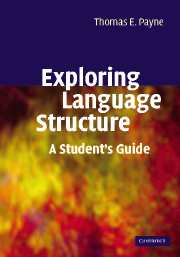Book contents
- Frontmatter
- Contents
- List of figures
- List of tables
- Preface
- Acknowledgments
- A note on transcriptions
- List of abbreviations
- 1 Introduction to morphology and syntax
- 2 Morphological processes and conceptual categories
- 3 Morphophonemics
- 4 Word classes
- 5 Exploring subclasses
- 6 Constituent structure
- 7 Language typology
- 8 Grammatical relations
- 9 Voice and valence
- 10 Multi-clause constructions
- Glossary
- References
- Subject and language Index
Preface
Published online by Cambridge University Press: 05 June 2012
- Frontmatter
- Contents
- List of figures
- List of tables
- Preface
- Acknowledgments
- A note on transcriptions
- List of abbreviations
- 1 Introduction to morphology and syntax
- 2 Morphological processes and conceptual categories
- 3 Morphophonemics
- 4 Word classes
- 5 Exploring subclasses
- 6 Constituent structure
- 7 Language typology
- 8 Grammatical relations
- 9 Voice and valence
- 10 Multi-clause constructions
- Glossary
- References
- Subject and language Index
Summary
Alice thought to herself, “There's no use in speaking.” The voices didn't join in this time, as she hadn't spoken, but, to her great surprise, they all thought in chorus (I hope you understand what thinking in chorus means – for I must confess that I don't), “Better say nothing at all. Language is worth a thousand pounds a word!”
Lewis Carroll, Through the Looking Glass (1872)If we could “think in chorus,” we would not need language. Language is one very important tool whereby individuals share and negotiate representations of situations, ideas, and feelings. Through language, individual minds are constantly influencing one another in sometimes subtle, and sometimes obvious, ways. The result is a culture, a society, a “common mind” that has many characteristics of a single organism. For example, it may “change,” “grow,” “stagnate,” “thrive,” “become sick,” “heal,” or “die.” Language is a physical, outward representation of individual mind-internal states. Communication, via language and other similar tools, is an essential component of all human collective activity. Perhaps this is why “Language is worth a thousand pounds a word!”
At present (2005), there is a body of terms and concepts that is an implicit part of the “common mind” that constitutes the culture of linguistic science. This book is, in part, an attempt to explicate a portion of that implicit common mind for beginning students.
- Type
- Chapter
- Information
- Exploring Language StructureA Student's Guide, pp. xiii - xivPublisher: Cambridge University PressPrint publication year: 2006



